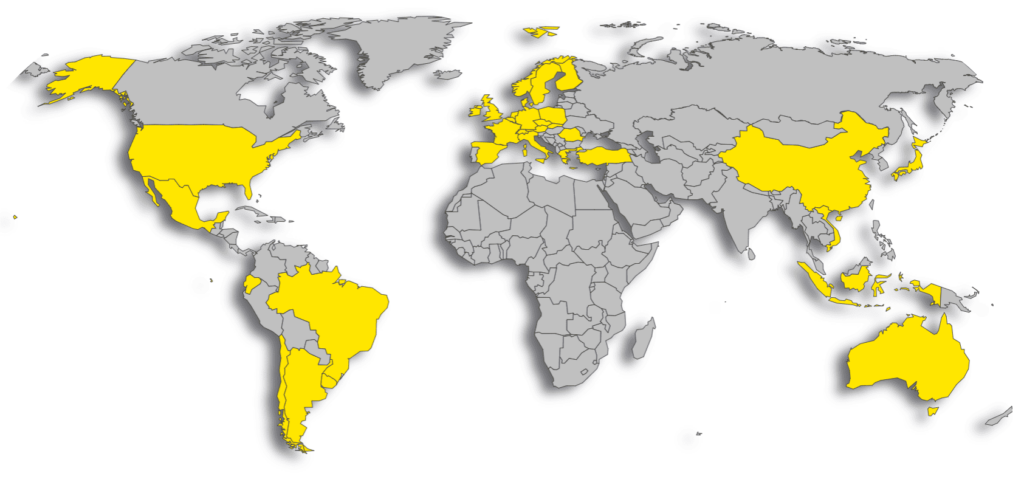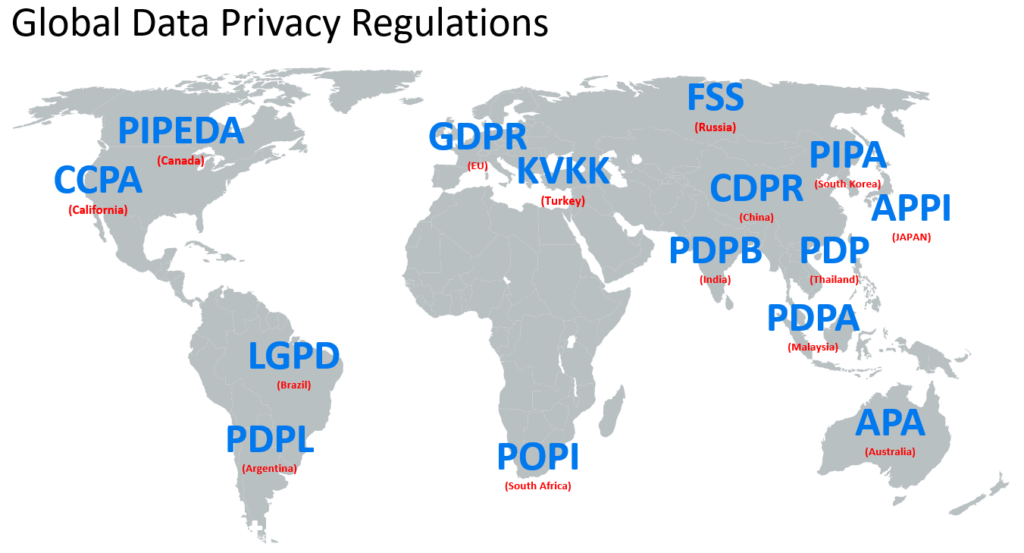In today’s interconnected world, businesses must navigate a complex landscape of data privacy laws. With increasing concerns about data breaches and personal privacy, regulations have been introduced globally to protect consumers and hold organizations accountable. Among these are the General Data Protection Regulation (GDPR), the California Consumer Privacy Act (CCPA), and the Australian Privacy Act. These laws have significant implications for businesses handling personal data, regardless of where they operate.
Understanding the nuances of these laws and how they apply to your business is crucial for ensuring compliance and avoiding hefty penalties. This article will explore the key features of GDPR, CCPA, and the Australian Privacy Act, and discuss how these regulations impact your business operations. Additionally, we will highlight how cybersecurity regulations Australia play a role in safeguarding personal data.
Why Data Privacy Laws Matter
Data privacy laws are designed to protect the personal information of individuals. As technology advances and businesses increasingly rely on digital data to provide services, the risks associated with data misuse and breaches have grown significantly. The GDPR, CCPA, and Australian Privacy Act are aimed at regulating how businesses collect, store, and share data, ensuring that individuals have greater control over their personal information.
For businesses, failing to comply with these laws can result in substantial fines, legal consequences, and reputational damage. Moreover, companies that adhere to these regulations can build trust with their customers, as consumers are more likely to engage with businesses that prioritize their privacy and data security. Cybersecurity regulations in Australia complement these laws by ensuring businesses take adequate measures to prevent data breaches and protect sensitive information.
General Data Protection Regulation (GDPR)
What is GDPR?
The General Data Protection Regulation (GDPR) was introduced by the European Union in 2018 and is considered one of the most comprehensive data privacy laws globally. The GDPR applies to any business, regardless of its location, that processes the personal data of EU residents. This regulation grants individuals greater control over their data and places significant obligations on businesses to ensure data protection.
Key Features of GDPR
- Data Subject Rights: Individuals (data subjects) have the right to access, correct, delete, or restrict the processing of their data. They can also request the transfer of their data to another service provider.
- Consent: Businesses must obtain clear and explicit consent from individuals before processing their data. Consent must be freely given, specific, and informed.
- Data Breach Notification: GDPR requires businesses to report data breaches to the relevant authorities within 72 hours of becoming aware of the breach.
- Data Protection Officers (DPOs): Companies that process large amounts of sensitive data are required to appoint a DPO to oversee data protection strategies and ensure compliance.
How GDPR Impacts Your Business
For businesses operating in or serving customers within the EU, GDPR compliance is non-negotiable. The regulation mandates stringent data protection practices, including secure data storage, encryption, and regular audits. Failure to comply can result in fines of up to 4% of global annual revenue or €20 million, whichever is higher.
Small businesses may feel that GDPR doesn’t apply to them, but if you collect data from EU citizens—whether through an online store or marketing efforts—you must adhere to GDPR requirements. Implementing robust data protection strategies and ensuring transparency in data collection will help your business comply and foster trust with your customers.

California Consumer Privacy Act (CCPA)
What is CCPA?
The California Consumer Privacy Act (CCPA) was enacted in 2020 and focuses on protecting the privacy rights of California residents. Similar to the GDPR, the CCPA grants individuals more control over their personal information and requires businesses to be transparent about data collection practices. While it only applies to California, businesses outside the state may still need to comply if they meet certain thresholds.
Key Features of CCPA
Consumer Rights:
California residents have the right to know what personal information is being collected about them and how it is being used, sold, or shared. They also have the right to request the deletion of their data.
Opt-Out of Data Sale:
Consumers can opt out of the sale of their personal information, and businesses must provide a clear mechanism for consumers to exercise this right.
Non-Discrimination:
Businesses are prohibited from discriminating against consumers who exercise their rights under the CCPA, such as by charging higher prices or providing inferior services.
Disclosure Requirements:
Businesses must disclose the categories of data they collect and provide a privacy policy that explains consumers’ rights.
How CCPA Impacts Your Business
If your business collects data from California residents, you may be required to comply with the CCPA. The law applies to companies that meet certain criteria, such as annual gross revenue exceeding $25 million, or handling the data of 50,000 or more California residents. Even if your business is not based in California, compliance with CCPA is crucial if you meet these thresholds.
For companies, this means being transparent about data practices and giving consumers the ability to opt out of data sharing or sales. Regular updates to privacy policies and providing clear communication channels are essential for maintaining compliance with CCPA.
Australian Privacy Act
What is the Australian Privacy Act?
The Australian Privacy Act 1988 regulates the handling of personal information by Australian government agencies and businesses. The Act is governed by the Australian Privacy Principles (APPs), which set out standards for the collection, use, and disclosure of personal data. Like the GDPR and CCPA, the Australian Privacy Act gives individuals rights over their personal data, while placing obligations on businesses to ensure data security and transparency.
Key Features of the Australian Privacy Act
Australian Privacy Principles (APPs):
These principles regulate how businesses collect, use, and disclose personal information. They include provisions on transparency, data security, and accountability.
Sensitive Information:
The Act places stricter rules on the handling of sensitive information, such as health records, race, or sexual orientation.
Data Breach Notification:
Under the Notifiable Data Breaches (NDB) scheme, businesses must notify individuals and the Australian Information Commissioner if they experience a data breach likely to cause harm.
Cross-Border Disclosure:
The Act imposes specific conditions on transferring personal data outside of Australia, requiring businesses to ensure equivalent data protection standards are maintained.
How the Australian Privacy Act Impacts Your Business
For Australian businesses or those dealing with Australian residents, compliance with the Australian Privacy Act is essential. Businesses must implement robust data security measures, regularly audit their data practices, and comply with notification requirements in the event of a data breach. Additionally, cybersecurity regulations in Australia work alongside the Privacy Act to ensure businesses take proactive steps in safeguarding sensitive information.
Failure to comply with the Australian Privacy Act can result in significant penalties, and businesses must ensure their privacy policies align with the requirements of the Act. Companies operating across borders should also be mindful of the cross-border data transfer provisions, ensuring compliance with international data protection standards.

How These Laws Work Together to Protect Consumers
While GDPR, CCPA, and the Australian Privacy Act are separate legal frameworks, they share a common goal: protecting the privacy and personal data of individuals. For businesses operating globally, understanding the similarities and differences between these laws is critical for ensuring compliance in each region.
At their core, these regulations:
- Emphasize transparency in how personal data is collected and used.
- Provide individuals with rights to access, correct, or delete their data.
- Require businesses to implement strong data security measures.
- Hold companies accountable for data breaches or misuse of personal information.
Preparing Your Business for Global Data Privacy Compliance
Given the global nature of modern business, complying with data privacy laws like GDPR, CCPA, and the Australian Privacy Act is no longer optional. It is essential to adopt a proactive approach to data privacy, which includes:
- Conducting regular data audits to ensure compliance with relevant laws.
- Updating privacy policies to reflect current regulations.
- Implementing technical safeguards, such as encryption and secure data storage.
- Training employees on data protection practices.
By integrating compliance into your business operations, you not only avoid costly penalties but also build trust with your customers, ensuring long-term success.
Conclusion
In an era where data breaches are increasingly common, adhering to global data privacy laws such as GDPR, CCPA, and the Australian Privacy Act is crucial for businesses of all sizes. Understanding how these regulations impact your business will help you stay compliant and safeguard the personal information of your customers. Additionally, cybersecurity regulations in Australia complement these laws by ensuring businesses take the necessary steps to protect sensitive data.
More to read: Understanding Family Law in Australia